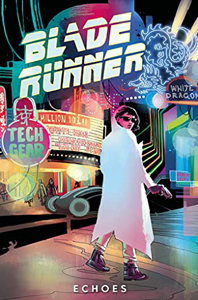Some shine has worn off Titan’s “Blade Runner” comics as we arrive at “Blade Runner 2029 Volume 2: Echoes” (collecting Issues 5-8 and the Free Comic Book Day issue from 2021). It’s still very good, but it’s not as eye-opening as earlier in the run.
From antihero to villain
Writer Mike Johnson comes up with a compelling dichotomy. For a while we have two sets of heroes playing out parallel stories. On one hand is former blade runner Ash, who now uses her hunting skills to free replicants from servitude. (There are exceptions, as seen in the short FCBD story: If a replicant crosses the line with vicious revenge murders on his path to freedom, she is willing to make like a traditional blade runner and retire the guy.)
Ash and her allies, namely lover and underground leader Freysa, aim to stay safe and hidden. Their lot in life isn’t as bad as, say, the future-war resistance fighters from “The Terminator” – which, coincidentally, also takes place in 2029. In past issues, we saw a vibrant underground (literally) social club for replicants.

“Blade Runner 2029” Issues 5-8 and Free Comic Book Day issue (2021)
Subtitle: “Volume 2: Echoes”
Writer: Mike Johnson
Art: Andres Guinaldo
Colors: Mark Lesko
On the other hand is Yotun, a Nexus-6 who extends his life via blood transfusions from his Nexus-8 followers. He also aims for replicant freedom, and so for a while it seems Ash and Yotun are very much on the same side.
(SPOILERS FOLLOW.)
Yotun even heals Ash’s broken spine in one of those bacta tank-style tubes that are a staple of science fiction.
The difference is he aims to kill all the corporate-political elites, take their place, and then rule the human underclass. “Benevolently,” he says, in one of those citywide announcements via big-screen hack that mark yet another genre trope. But I wonder if anyone who seeks power – rather than being assigned power via the populace – can possibly be a benevolent ruler.
As “Echoes” moves forward, Johnson is intent on morphing Yotun from an intriguing antihero to a more generic villain.
Compelling commonalities – for a while
For a while, the echoes between Ash and Yotun are compelling to mull over. But Johnson doesn’t let us do so for long – especially if you’re reading this in one sitting in trade-paperback format.
In the final act of “Echoes,” Yotun announces to Los Angeles’ populace that he is their new overlord. Then, when she disconnects his TV tap, he violently attacks Freysa. Meanwhile, Ash isn’t exactly complaining about having her spine healed; she admits to feeling something “close to joy.” Dating all the way back to Philip K. Dick’s Deckard, we haven’t seen much happiness in a bounty hunter/blade runner.
But Yotun’s gift of a functional spine does not lead to mixed loyalties within Ash. In narration, she says “I’ll find Yotun. Thank him. And kill him.” And this is before Yotun maims Ash’s lover.
So there’s a rushed quality to “Echoes.” We don’t get to wallow in the similarities between Ash and Yotun. Instead, Johnson does everything he possibly can to make sure we know Yotun is a capital-V villain by story’s end.
Some of the “Blade Runner” aesthetic has been sacrificed. The saga has always been about the uneasy wrongness of what the heroes do and the uneasy righteousness of what the villains do. “Echoes” reframes things and moves into generic good-and-evil territory.


